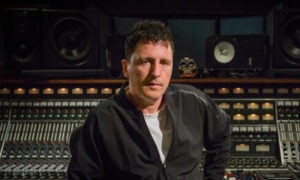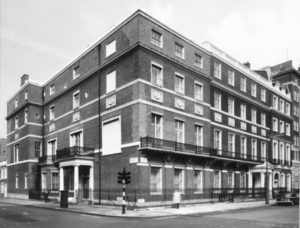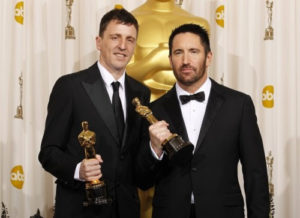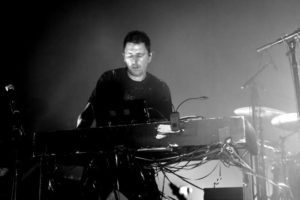|
Issue Nine Perhaps there is nothing that can conjure up memories like a particular musical composition or song. Music can nourish us and leave an indelible mark on our personal experiences. In his book Musicophilia, the neurologist Oliver Sacks writes about how music occupies more areas of our brain than language. According to Agnes Martin, ‘the highest form of art is music. It’s the most abstract of all art expression.’ Atticus Ross reveals how his art-inspired upbringing and early exposure to artistic experiences led to his becoming an undergraduate at The Courtauld, and how his musical experiences were always part of his life-long journey into self-discovery and learning. He describes his time in London and New York, going to underground clubs and live performances, and how these experiences helped him to discover new styles and make personal connections and discoveries that have led to his recent success. Helen Lee-Warren |

Atticus Ross
BA, 1989
What were your early childhood art influences?
It’s no secret but my aunt Jacquetta was Lucien Freud’s main model and girlfriend for a period of time. I just knew him as Lucien. I’ve got five brothers and sisters and my parents wanted us to grow up in a very untraditional way, which had both plusses and minuses, in retrospect. So I had been around a lot of artists. When I was a teenager, my father opened a huge nightclub in Los Angeles, a kind of Studio 54 on roller skates. I sort of grew up in that nightclub and then got a scholarship to Eton. So I had an upbringing of extreme opposites. In London I lived with my aunt Jacquetta and my cousin in Notting Hill Gate, when it was a very bohemian kind of place.

Tell us about your time at The Courtauld.
Yeah, I definitely enjoyed it. I knew if you wanted to study art history, then the best place to do that is at The Courtauld. It was in Portman Square then. They only took about 25-30 students each year so I was very lucky to get in.
My number one memory of The Courtauld was being called into the Dean’s office at the end of my first year and being told that I was spending far too much time out at night and not enough time studying — and that was true.
“I don’t think I would be making the kind of music that I make if I hadn’t had the education in art history to understand how different artists had looked at things. Perspective is just as important in the world of music as it is in painting.”
What was that time like for you in London?
It was a great time in London then. I was living with a girlfriend, Sophie Conran, and working at the Portobello Hotel as a bellboy on the weekends. It was the time of acid house, the punk rock of our generation. This was pre-internet, so it felt very much like you were a part of a movement that no one else knew about, because it only happened in a couple of places. And when you’re young, it’s just a very exciting time. So, a lot of my memories are kind of mixed up between time spent studying and time spent partying.
How did studying at The Courtauld influence your work?
One of the things about The Courtauld is that within the art world, it’s a great calling card. I ended up going to New York, meeting Annina Nosei, and working for Julian Pretto, who had a gallery and did shows that interconnected music and art. He was the first person to show Laurie Anderson’s work as an art piece. I think a lot of artists think art and music go hand in hand. It did feel like anything was possible at that point in time. The order was changing, there were no stars, it was about a community. Those were the early and glory days of hip hop, the music of the city, and New York was the center.
There’s never been a masterplan. It’s just been a case of going with sometimes insane ideas, like moving to New York after visiting for a weekend and discovering and experiencing something new. That’s what’s good about not making any plans. I think I’ve been open to the moment.
I think that the artistic pursuit, whether that be music, painting or whatever, is a journey of learning that never ends. It’s a feedback loop into your own life and experience because that’s all you can project. Just pure expression.
What has life been like during the pandemic? You managed to do quite a lot of work…
First of all, it was great to spend time with my wife and three kids. We had to get to grips with homeschooling and that kind of thing.
I was finishing Soul right into the start of Covid. And then David Fincher literally finished the last day of production on Mank when Covid hit. So we were incredibly busy. Winning the Oscars was insane, and greatly appreciated. We were inducted into the Rock and Roll Hall of Fame last year but these are not things that you are ever thinking about when you’re doing the work. It’s never been about the outside successes, which of course are really nice. I honestly don’t think I could make the sound I could hear in my head until I was in my mid-30’s. That’s when I really started to feel confident. I don’t think I would be making the kind of music that I make if I hadn’t had the education in art history to understand how different artists had looked at things. Perspective is just as important in the world of music as it is in painting. I think the type of music that we create is very much about the landscape. My goal has always been to be surrounded by art in one way or another. And so, to find oneself as an artist is like hitting the jackpot.
With all the bad of Covid, what I hope is that it will be transformative. I can’t imagine that anyone didn’t examine their life, in terms of what is important and what is not.

Why do you like to support emerging artists?
I try to support young artists for two reasons. Firstly, they’re in my price range. Secondly, I’m interested in how things are changing. I like the idea that art is for everyone. I think a lot of people feel excluded from art because they feel like they need some academic understanding. That’s not how I experience art. I am interested in the academic side, but I’m interested in my emotional response to it more. And that’s the same with every art form. I like the concept of finding and supporting a new artist in any medium.
Any words of wisdom?
‘Don’t worry’. I know I’ve spent a lot of time worrying about things that never happened. And I’m never going to get that time back.

Atticus Ross is an award-winning musician, composer, songwriter, record producer and audio engineer. After 15 years of studio work together, in 2016 he became the second official member of the world-renowned industrial rock group Nine Inch Nails. Atticus received his first Oscar in 2011, for Best Original Score for the film The Social Network. He received a second Oscar earlier this year, along with Trent Reznor and Jon Batiste, for Best Original Score in the animated Pixar film Soul. He has also been awarded two Golden Globe Awards, two Academy Awards and a BAFTA, along with many other prestigious accolades. Atticus completed his BA at The Courtauld in 1989.
Previous Postcards:
Deborah Swallow — Märit Rausing Director of The Courtauld
Bill Griswold — Director of the Cleveland Museum of Art
Jason Farago — Art Critic, The New York Times
Joachim Pissarro — Art Historian, Theoretician, and Director of the Hunter College Galleries
Sara Turner — US Department of Justice
Mary Rozell — UBS Art Collection
Beth Greenacre — Curator and Art Consultant



